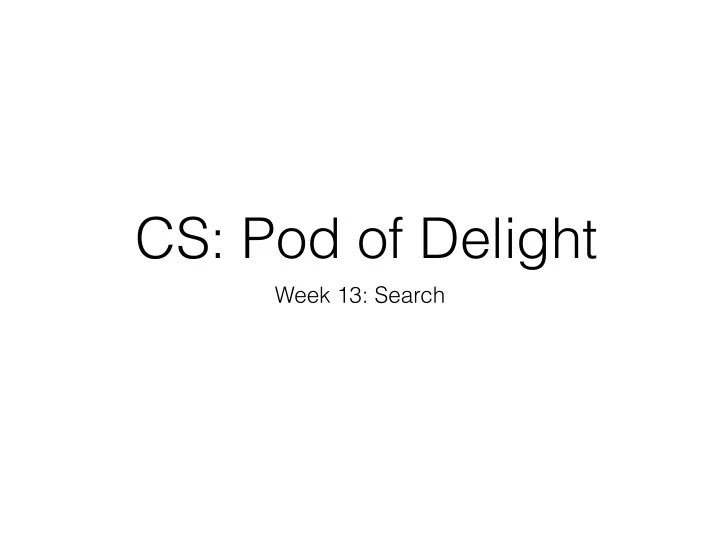

CS: Pod of Delight Week 13: Search
Logistics • How is everyone doing? • Semester is almost over! • No Pod next week, go home enjoy thanksgiving! • The week after, party! • Then you’re done! Off you go into the real world!
So you want to build a search engine? • Search engines have four main problems • Crawling • Index • Search • Ranking
Crawling • The internet is a massive jungle of links • Goal: find them all • How? • Follow every link in every page • Exponential • Problems: • Where do you start? • How do you know if you’ve already seen a page? (cycles)
Crawling: Implemented • Need a way to get webpage • All webpages are nothing but some text (html/ css/js) and media (images/flash/videos/music) • Need a way to parse source code • Parse the html DOM tree, and provide methods for traversing it, querying it, etc… • Jsoup
Crawling: Problems • Where do you start? • Google originally started crawling on Larry Page’s Stanford personal website • How do you prevent cycles? • Hashtable • Bloom filter
Index • So you found the internet, now what? • Store what you found • Efficient representation of the content so you can query it
Inverted Index • Maps words to locations • Map words to documents • For a given word map to which documents it can be found in • How to store? • Hashmap • B-tree
How to build it? • Parse every word of content • Map the word to the document where you found it • What if there are multiple documents with that word • Map to a set • What if there are multiple occurrences of that word in the document? • Doesn’t matter! • Or does it?
What if you want to store phrases? • Could map all word tuples, or triplets! • Too much space! • Instead map word to document, and place in document • You store all occurrences • Advantages: • Can search for where in document word is! • Can perform phrase searches!
So searching • You have your index, awesome! • How do you search it? • Look up a word in the index, boom! • What if you want to search for multiple words • Look up all, return the intersection, boom! • What if you want to search for the union of words? • Look up all, return the intersection, boom! • What if you want to search for the union or intersections? • You get the point
Humans • Biggest problem: English • Language is imprecise • Have to parse an English query • Can have explicit and implicit ANDs and ORs • Need to parse queries like • “the duck is awesome” • the duck is awesome • the | duck | is | awesome • (the duck) | (is awesome) • the duck | “is awesome”
Recursive descent parser • First define a context-free-grammar (CFG) for your language • Then start parsing it top-down, consuming input as it matches • Keep parsing until either all the input is consumed or you encounter an error (input doesn’t match what you expected)
RDP: Implemented • First want to tokenize your input • StringTokenizer • Deal with whitespace (either too much, too little, etc) • Then build a recursive descent parser • Start at the start state, build methods to consume input for each of the non-terminal states • Store the query in some representation • Probably want a tree!
Searching • You have your query tree • Then perform it, keeping a list of pages as you go • Little tricks and optimizations • If you have intersect, only search the result of the first query
Ranking • Cool! You have your list of webpages • How do you return them? How do you rank? • Need a way to score a match • Number of word occurrences • Where in the document the word appears • Is it in the title? Big text? small text? colored? underlined? • How close two words appear to each other? • Exact match vs approximate match?
PageRank • As you crawl, store all websites that point back to a given website (backlinks) • The more a website is linked to, the better the content • Rank higher • Links from higher ranked websites are more meaningful
Results • Take all the matches you found • Score all of them • Sort them • Return them to the user • Profit???
Good luck :)
Recommend
More recommend